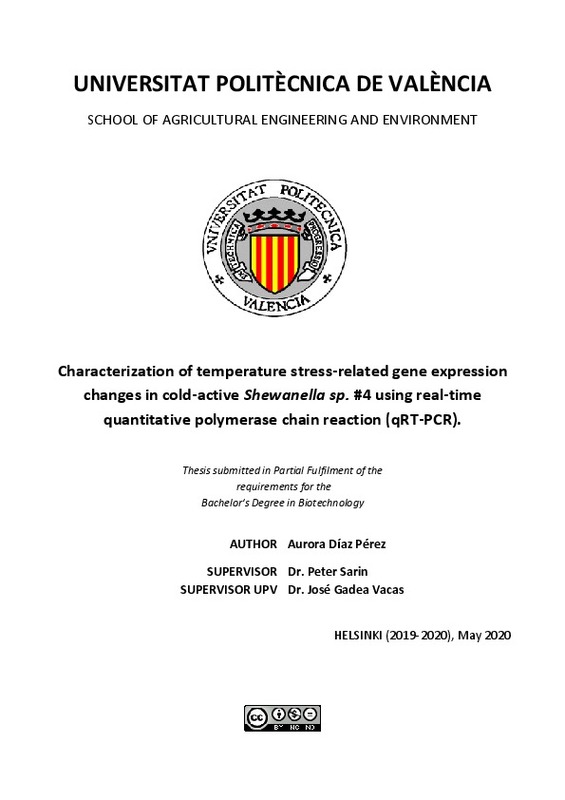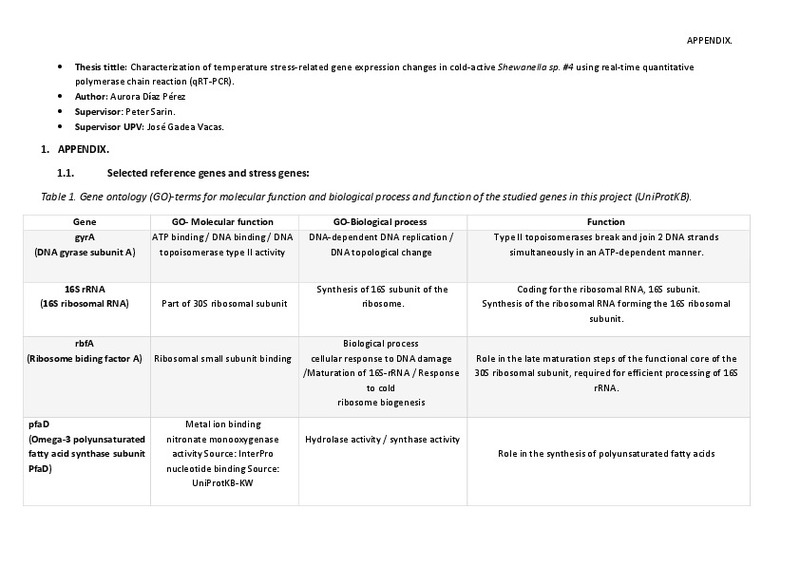JavaScript is disabled for your browser. Some features of this site may not work without it.
Buscar en RiuNet
Listar
Mi cuenta
Estadísticas
Ayuda RiuNet
Admin. UPV
Characterization of temperature stress-related gene expression changes in cold-active Shewanella sp. #4 using real-time quantitative polymerase chain reaction (qRT-PCR)
Mostrar el registro sencillo del ítem
Ficheros en el ítem
| dc.contributor.advisor | Gadea Vacas, José
|
es_ES |
| dc.contributor.advisor | Sarin, Peter
|
es_ES |
| dc.contributor.author | Díaz Pérez, Aurora
|
es_ES |
| dc.date.accessioned | 2020-07-15T10:26:20Z | |
| dc.date.available | 2020-07-15T10:26:20Z | |
| dc.date.created | 2020-06-18 | |
| dc.date.issued | 2020-07-15 | es_ES |
| dc.identifier.uri | http://hdl.handle.net/10251/148045 | |
| dc.description.abstract | [EN] Shewanella sp. #4 belongs to the Shewanella genus, which is a unique member of the marine bacteria family Shewanellaceae. They are Gram-negative facultatively anaerobic, rod-shaped bacteria that are found in aquatic environments, where low temperatures and high pressures are common. More than 50 species of Shewanella are currently known and the interest surrounding these bacteria resides in its participation in diverse geochemical cycles, fish spoilage, and its potential usage in bioremediation processes. Shewanella is able to adapt to a wide range of environmental conditions. To have a better understanding of the mechanisms that allow the cold-active Shewanella sp. #4 to thrive under such diverse stresses, temperature stress was simulated in laboratory conditions to analyze gene expression of stress-related genes. This work aims to assess the expression of genes related to stress responses using the quantitative reverse transcription polymerase chain reaction (qRT-PCR). More specifically, the polyunsaturated fatty acid synthase D subunit (pfaD) and Ribosome Binding Factor A (rbfA) genes, related to low temperature dependent changes, were selected. The expression of the gene pfaD is related with the increse of polyunsaturated fatty acids, which makes the cell membrane more flexible in cold conditions and rbfA is an initiaton factor in the stress response. The different expression of these genes in stress conditions induced by low or high temperature were expected. The standard laboratory growth temperature for Shewanella sp. #4 is 15ºC, thus to evaluate the gene expression levels in low and high temperature stress conditions, 5ºC and 25ºC were applied. Since Shewanella sp. #4 has not been applied to qPCR analyses before, related methods needed to be optimized prior to gene expression studies. Indeed, the aim of this thesis was also to elucidate the most efficient method to isolate total RNA from Shewanella #4. The goal was to apply the optimized protocol to obtain the total RNA samples from which gene expression would be analyzed. Another aim was to determine stable ¿housekeeping¿ genes, to ensure the reliability of the results and, finally, to analyze the gene expression of the selected target genes using qRT-PCR in total RNA samples extracted from bacteria cultured under different growth conditions. | es_ES |
| dc.description.abstract | [ES] La bacteria Shewanella sp. #4 pertenece al género Shewanella, único miembro de la familia Shewanellaceae, compuesta principalmente por bacterias marinas. Estas son bacilos Gram negativos, facultativos anaeróbicos que están sobre todo presentes en ambientes acuáticos extremos, donde hay temperaturas extremadamente bajas y muy altas presiones. Se han encontrado más de 50 especies de este género y el interés en este es creciente por las condiciones que son capaces de soportar, por su participación en diversos ciclos geoquímicos, en el deterioro del pescado y su potencial en procesos de biorremediación. Esta bacteria psicrófila es capaz de adaptarse a diferentes condiciones ambientales. Para comprender mejor los mecanismos que le permiten estar sometida a diferentes estreses y continuar con sus actividades vitales, se simuló estrés por temperatura en el laboratorio para analizar la expresión de genes relacionados con la respuesta de la bacteria a estos estímulos. En este trabajo se pretende evaluar la expresión génica de genes relacionados con respuestas a condiciones de estrés utilizando la reacción en cadena de la polimerasa con transcriptasa reversa cuantitativa (qRT-PCR). Más concretamente, se han seleccionados los genes codificantes para la subunidad D de la sintetasa de los ácidos grados polinsaturados (pfaD) y para el factor A de unión al ribosoma (rbfA), relacionados con cambios bajas temperaturas. El primero porque el aumento de los ácidos grasos poliinsaturados hacen las membranas más flexibles en condiciones frías y el segundo al como factor de iniciación de respuestas por estrés. Por ello, era esperada una expresión diferencial inducida por alta o baja temperatura. La temperatura óptima para el crecimiento de Shewanella sp. #4 es 15ºC, para evaluar los niveles de expresión génica en bajas y altas temperaturas se cultivaron las células a 5ºC y 25ºC. Dado que Shewanella sp. #4 no ha sido empleada en qPCR experimentos anteriormente, antes de realizar el análisis en sí, los métodos relacionados con la técnica tuvieron que ser optimizados. Así, los objetivos de este trabajo eran hallar el método más eficiente para aislar ARN total de esta bacteria y, de esta forma, aplicarlo para obtener las muestras a partir de las que se analizará la expresión génica. Otro objetivo era determinar genes estables ¿housekeeping¿ para asegurar la fiabilidad de los resultados y, finalmente, analizar la expresión génica relativa de los genes diana seleccionados mediante qRT-PCR en muestras de ARN total extraídas de bacterias cultivadas en las diferentes condiciones de crecimiento. | es_ES |
| dc.format.extent | 60 | es_ES |
| dc.language | Inglés | es_ES |
| dc.publisher | Universitat Politècnica de València | es_ES |
| dc.rights | Reconocimiento - No comercial - Sin obra derivada (by-nc-nd) | es_ES |
| dc.subject | Shewanella #4 | es_ES |
| dc.subject | Estrés por temperatura | es_ES |
| dc.subject | Reacción en cadena de la polimerasa cuantitativa | es_ES |
| dc.subject | Expresión génica | es_ES |
| dc.subject | PfaD | es_ES |
| dc.subject | RbfA. | es_ES |
| dc.subject | Shewanella sp.#4 | es_ES |
| dc.subject | Temperature stress | es_ES |
| dc.subject | Real-Time Polymerase Chain Reaction | es_ES |
| dc.subject | Gene expression | es_ES |
| dc.subject.classification | BIOQUIMICA Y BIOLOGIA MOLECULAR | es_ES |
| dc.subject.other | Grado en Biotecnología-Grau en Biotecnologia | es_ES |
| dc.title | Characterization of temperature stress-related gene expression changes in cold-active Shewanella sp. #4 using real-time quantitative polymerase chain reaction (qRT-PCR) | es_ES |
| dc.title.alternative | Caracterización de los cambios de expresión de genes relacionados con el estrés por temperatura en la bacteria psicrófila Shewanella sp. #4 mediante la reacción en cadena de la polimerasa cuantitativa a tiempo real (qRT-PCT) | es_ES |
| dc.type | Proyecto/Trabajo fin de carrera/grado | es_ES |
| dc.rights.accessRights | Abierto | es_ES |
| dc.contributor.affiliation | Universitat Politècnica de València. Departamento de Biotecnología - Departament de Biotecnologia | es_ES |
| dc.contributor.affiliation | Universitat Politècnica de València. Escuela Técnica Superior de Ingeniería Agronómica y del Medio Natural - Escola Tècnica Superior d'Enginyeria Agronòmica i del Medi Natural | es_ES |
| dc.description.bibliographicCitation | Díaz Pérez, A. (2020). Characterization of temperature stress-related gene expression changes in cold-active Shewanella sp. #4 using real-time quantitative polymerase chain reaction (qRT-PCR). http://hdl.handle.net/10251/148045 | es_ES |
| dc.description.accrualMethod | TFGM | es_ES |
| dc.relation.pasarela | TFGM\130403 | es_ES |
Este ítem aparece en la(s) siguiente(s) colección(ones)
-
ETSIAMN - Trabajos académicos [3541]
Escuela Técnica Superior de Ingeniería Agronómica y del Medio Natural







